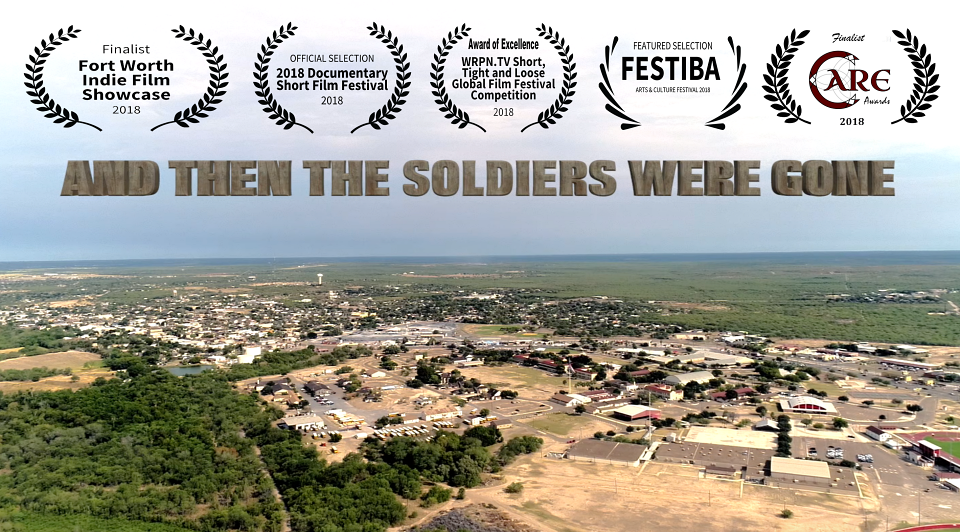By Amanda Alaniz
EDINBURG, TEXAS – UTRGV’s Community Historical Archaeology Project with Schools (CHAPS) program has two main goals: tell stories, and share the rich history of the Rio Grande Valley.
They’ve accomplished both with a documentary about Fort Ringgold in Rio Grande City.
“And Then the Soldiers Were Gone” already has stacked up nominations from previous international film festivals and awards, and now they can add another to the list – a Bronze Telly Award.
The Telly Awards annually showcase the best work created within television and across video, for all screens and from around the world.
“And Then the Soldiers Were Gone” focuses on the history of Fort Ringgold, the former military base in Rio Grande City turned school, through stories from the residents.
The documentary film crew included:
- Roseann Bacha-Garza - lead researcher, CHAPS program manager, UTRGV part-time lecturer.
- Mario Deleón – production lead, owner of Damaso Creative.
- Valerie Guerra – researcher, interviewer, UTRGV history student, Engaged Scholar.
- Dr. Christopher Miller - executive producer, CHAPS co-director, UTRGV history professor.
- Melissa Ochoa - assistant producer, writer, UTRGV alumna.
- Dr. Russell Skowronek - executive producer, CHAPS co-director, UTRGV professor of history and anthropology.
- Dr. Nick Taylor – producer, lead writer, camera op, co-editor, UTRGV lecturer II of Broadcast Journalism.
- Jamie Treviño - script research, first draft, UTRGV communications student and Engaged Scholar.
- Ivette Vargas – host.
Taylor submitted the documentary to the Telly Awards, but he didn’t inform anyone about it because he was fully prepared for it to not be accepted.
He was in shock when he received the email that the film had won, he said.
“This documentary turned out the way we envisioned it,” Taylor said. “The first time I saw the people of Rio Grande City watch it – they said, ‘This is us. This is who we are’ – I knew we had something special. I knew it was something that needed to be promoted and pushed.”
Skowronek said documentaries like this one really do showcase the Valley’s uniqueness and how much unknown history there is.
“We realize that film can focus the attention of a population to say, ‘I want to know more about it.’ When we have a film like ‘And Then the Soldiers Were Gone,’ to have people say, ‘Wow, there was an army base in Rio Grande City for 100 years? Why don’t I know about it?’ Even though you drive by and see the words ‘Fort Ringgold,’ we want them to know about it. We want people to be intrigued enough to know more,” he said.
Bacha-Garza said awards for the documentary have increased community pride and inspired the CHAPS team to further explore Valley stories that need to be told.
“This award means a great deal to us. It means that even though we are down here in the far stretches of the U.S.-Mexico borderlands, our stories have captured the attention of more folks than we can imagine,” she said. “Not only does this award validate our passion for Rio Grande Valley history, but Dr. Taylor and his film production team are talented film producers and we are very fortunate to be working with them.”
Two other documentaries from CHAPS, “Just a Ferry Ride to Freedom” and “A Letter to Roma,” were accepted to the Fort Worth Indie Film Showcase.
The CHAPS team agrees these awards and recognitions help garner positive attention for UTRGV and the CHAPS program, as well as a chance to continue to preserve regional history.
“We’ve got stories to tell and, up to this point, not too many people have told them. Well, we’re changing that,” Skowronek said.
“And Then the Soldiers Were Gone” is being shown to Rio Grande City high school students. To learn about CHAPS and future projects visit www.utrgv.edu/chaps or contact Bacha-Garza at roseann.bachagarza@utrgv.edu.
ABOUT UTRGV
The University of Texas Rio Grande Valley (UTRGV) was created by the Texas Legislature in 2013 as the first major public university of the 21st century in Texas. This transformative initiative provided the opportunity to expand educational opportunities in the Rio Grande Valley, including a new School of Medicine and a School of Podiatry, and made it possible for residents of the region to benefit from the Permanent University Fund – a public endowment contributing support to the University of Texas System and other institutions.
UTRGV has campuses and off-campus research and teaching sites throughout the Rio Grande Valley including Brownsville (formerly The University of Texas at Brownsville campus), Edinburg (formerly The University of Texas-Pan American campus), Harlingen, Weslaco, McAllen, Port Isabel, Rio Grande City and South Padre Island. UTRGV, a comprehensive academic institution, enrolled its first class in the fall of 2015; the School of Medicine welcomed its first class in the summer of 2016, and the School of Podiatric Medicine in the fall of 2022.

